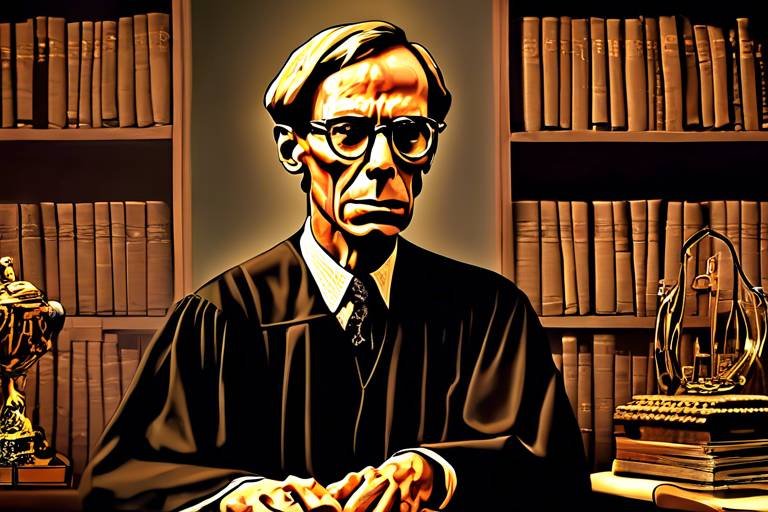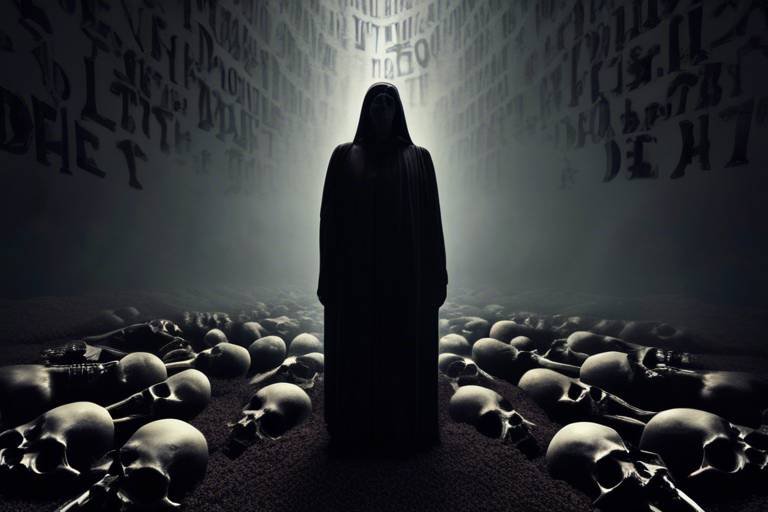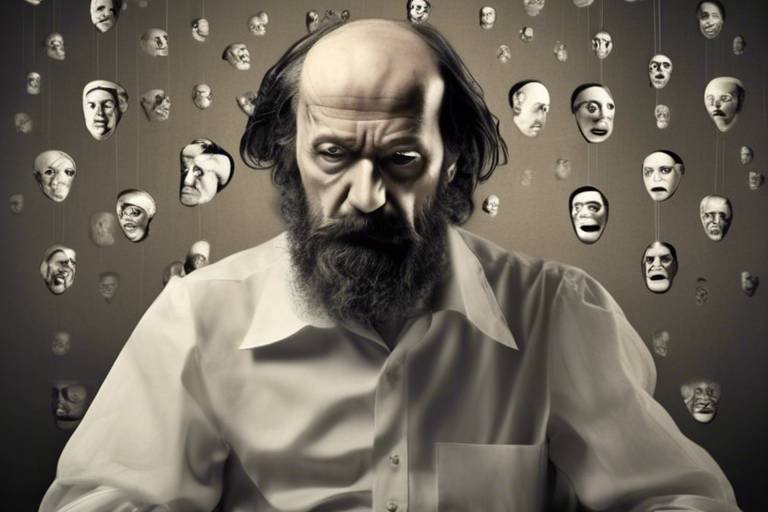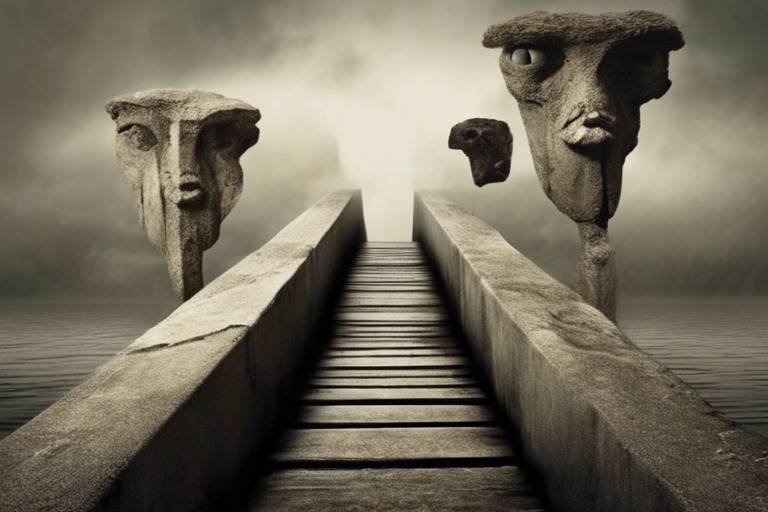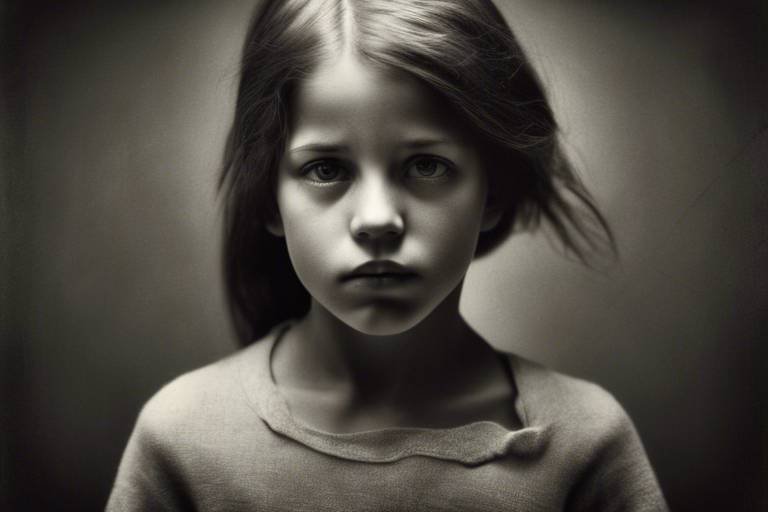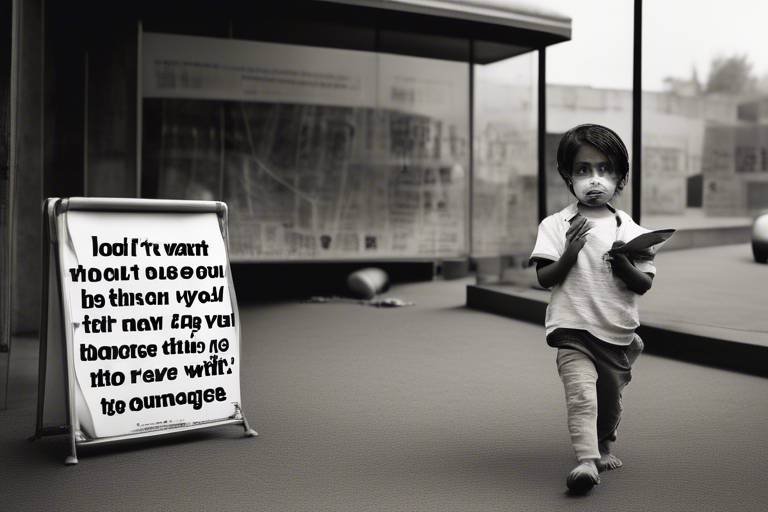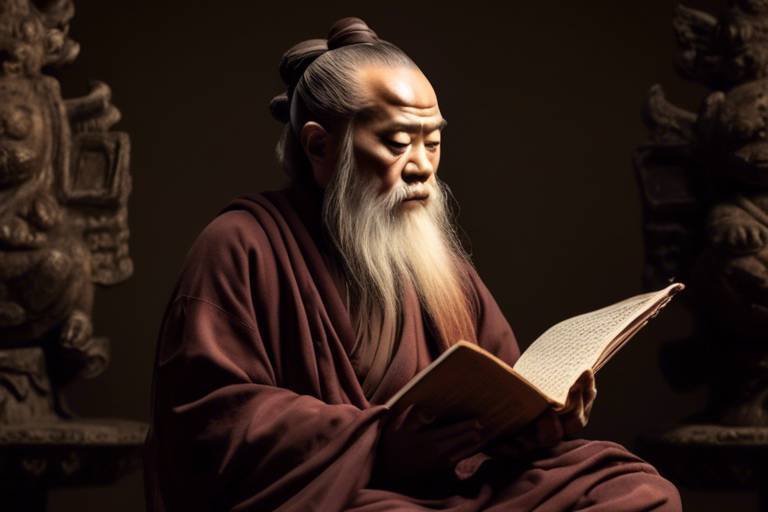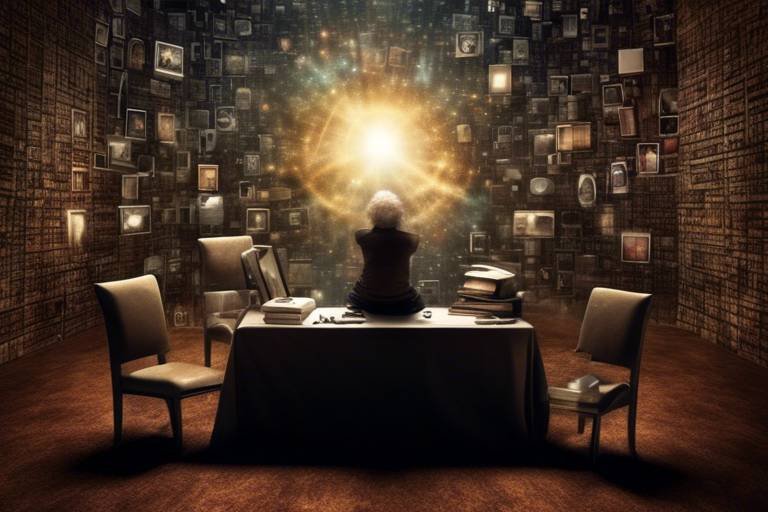The Debate Over the Existence of Ghosts - A Philosophical Approach
The question of whether ghosts exist has tantalized humanity for centuries. Is there life after death? Are we merely physical beings, or is there something more ethereal that transcends our corporeal existence? This article seeks to explore the philosophical arguments surrounding the existence of ghosts, examining various perspectives, evidence, and implications for human understanding of reality and the afterlife. In doing so, we will traverse historical beliefs, delve into metaphysical discussions, and consider the ethical ramifications of our beliefs about the supernatural. So, grab your favorite beverage, settle in, and let’s embark on this intriguing journey together!
Throughout history, different cultures have viewed ghosts through a myriad of lenses. From ancient civilizations that revered their ancestors as spirits watching over the living, to modern societies that often dismiss such beliefs as mere superstition, the perception of ghosts is deeply rooted in cultural context. For example, in ancient Egypt, the concept of the afterlife was integral to their belief system, leading to elaborate burial practices intended to honor and preserve the deceased's journey into the next realm. In contrast, many contemporary Western cultures often regard ghosts as figments of imagination or psychological phenomena.
Interestingly, the evolution of ghostly beliefs can be seen as a reflection of societal changes. In times of war or plague, reports of hauntings often surged, perhaps as a way for people to cope with the trauma of loss. This historical lens not only enriches our understanding of ghosts but also highlights the human need to connect with those who have passed on. The ghosts of our ancestors serve as a bridge between the past and present, reminding us of our shared humanity.
When we delve into the philosophical arguments supporting the existence of ghosts, we encounter a fascinating interplay of metaphysics and consciousness. Many philosophers argue that our understanding of reality is limited to what we can perceive through our senses. However, this perspective can be challenged by considering the nature of consciousness itself. What if consciousness exists independently of the physical body? This leads us to the concept of dualism, which posits that the mind and body are separate entities. Could this separation allow for the existence of a soul that persists after death, manifesting as a ghost?
Exploring dualism further, we find that it raises profound questions about the nature of existence. If the mind can exist apart from the body, then the possibility of ghosts becomes more plausible. This perspective invites us to ponder: what happens to our consciousness when our physical form ceases to function? Are we simply extinguished, or do we transcend into another realm? This philosophical inquiry opens the door to consider anecdotal evidence, such as near-death experiences, as potentially valid insights into the afterlife.
Near-death experiences (NDEs) provide compelling accounts that some argue support the existence of a spiritual realm where ghosts might dwell. Individuals who have had NDEs often report similar experiences: feelings of peace, encountering bright lights, or even meeting deceased loved ones. While skeptics may attribute these experiences to brain activity during trauma, the consistency of these accounts across different cultures and backgrounds raises intriguing questions about the nature of consciousness and existence beyond the physical.
In addition to NDEs, various paranormal phenomena—such as apparitions, unexplained noises, and objects moving without apparent cause—have been cited as evidence for ghosts. While some may argue that these experiences can be explained through psychological or environmental factors, others contend that dismissing them outright overlooks the possibility of a deeper, spiritual reality. Consider the famous quote by philosopher David Hume: "A wise man proportions his belief to the evidence." What evidence are we willing to accept, and how does that shape our understanding of life and death?
On the flip side, materialist philosophy presents a strong challenge to the belief in ghosts. Materialists argue that everything, including consciousness, can be explained through physical processes. They assert that experiences attributed to ghosts can often be traced back to psychological phenomena, such as grief, stress, or even environmental factors like electromagnetic fields. This perspective emphasizes the importance of scientific inquiry and empirical evidence in understanding our reality. However, it also raises a critical question: can science truly explain everything, or is there an aspect of existence that eludes our current understanding?
Belief in ghosts carries significant ethical implications that can influence behavior, cultural practices, and societal norms regarding life and death. For many, the idea that deceased loved ones may linger as spirits can provide comfort during the grieving process. It can foster a sense of connection that transcends the finality of death. However, for others, these beliefs may complicate acceptance of loss, leading to prolonged grief or an inability to move forward.
Beliefs in ghosts can profoundly affect how individuals and families navigate their grief. For some, the thought of a loved one watching over them can be a source of solace. They may feel guided by their spirit, finding strength in the belief that their loved one is still present in some form. Conversely, others may find themselves trapped in a cycle of longing, unable to let go and accept the loss. This duality highlights the complexity of human emotions and how our beliefs shape our experiences.
In contemporary culture, ghosts have found a prominent place in media, entertainment, and popular belief. From ghost-hunting reality shows to horror films that capitalize on our fear of the unknown, the portrayal of ghosts continues to evolve. These representations shape our understanding and acceptance of the supernatural, often blurring the lines between reality and fiction. As we engage with these narratives, we are invited to reflect on our beliefs and the impact they have on our lives.
- Are ghosts real? The existence of ghosts is a matter of personal belief and philosophical interpretation.
- What do near-death experiences tell us about ghosts? NDEs often provide anecdotal evidence that some interpret as support for the existence of a spiritual realm.
- How do beliefs in ghosts affect grieving? Beliefs can either comfort individuals or complicate the acceptance of loss.
- What is materialism's stance on ghosts? Materialists argue against the existence of ghosts, attributing experiences to psychological or environmental factors.

Historical Perspectives on Ghosts
Throughout history, the concept of ghosts has been woven into the fabric of human culture, reflecting our deepest fears, hopes, and beliefs about life and death. From ancient civilizations to modern societies, the perception of ghosts has evolved, often mirroring the values and norms of the time. In ancient Egypt, for instance, the afterlife was a significant aspect of their belief system, leading to the construction of elaborate tombs and rituals aimed at ensuring a safe passage for the deceased. The Egyptians believed in a spiritual realm where the souls of the departed could interact with the living, laying the groundwork for many ghostly legends.
Moving through time, we find that the Greeks and Romans also had their own interpretations of ghosts. They viewed the souls of the dead as lingering presences that could influence the living. The famous tale of the ghost of Hamlet's father from Shakespeare's play encapsulates the idea that spirits can return to convey messages or seek revenge. This illustrates how literature has played a pivotal role in shaping our understanding of ghosts and the supernatural.
In the Middle Ages, the belief in ghosts took on a more ominous tone. The rise of Christianity brought about a dualistic view of the afterlife, where souls were judged and either rewarded or punished. Ghosts were often seen as souls in purgatory, trapped between heaven and hell, which led to widespread fear and fascination. The Black Death further fueled ghost stories, as people sought to explain the inexplicable loss of life. Tales of wandering spirits became common, serving as both cautionary tales and a means of coping with grief.
As we entered the Enlightenment period, the perception of ghosts began to shift once again. The rise of science and rational thought led many to question the existence of the supernatural. Philosophers and scientists sought to explain ghostly encounters through natural phenomena, arguing that what people perceived as spirits were merely figments of the imagination or the result of psychological distress. This skepticism, however, did not extinguish the belief in ghosts; instead, it transformed the narrative, leading to a more nuanced understanding of the supernatural.
In contemporary society, ghosts are often depicted in popular culture, from horror films to reality TV shows. These representations reflect a fascination with the unknown and the enduring belief in an afterlife. The paranormal investigation boom of the late 20th century has also contributed to the revival of ghost stories, as people seek to connect with the past and explore the mysteries of existence. Ghost tours, haunted houses, and ghost-hunting apps have become part of our cultural landscape, demonstrating a persistent curiosity about what lies beyond our mortal experience.
In summary, the historical perspectives on ghosts illustrate a rich tapestry of beliefs that have evolved over centuries. Each culture and era has contributed to the ongoing debate about the existence of spirits, reflecting our collective anxieties and hopes regarding death and the afterlife. As we continue to grapple with these profound questions, the stories of ghosts remain an integral part of our human experience, inviting us to ponder the mysteries that lie beyond.

Philosophical Arguments for Existence
The debate over the existence of ghosts isn't just a matter of spooky stories and late-night campfire tales; it dives deep into the realm of philosophy. When we talk about the existence of ghosts, we are entering a complex web of metaphysical considerations that challenge our understanding of consciousness and reality itself. One of the most compelling philosophical arguments in favor of the existence of ghosts is rooted in the idea of dualism, which posits that the mind and body are distinct entities. This perspective opens the door to the possibility that consciousness can exist separately from the physical body, allowing for the notion of an afterlife where spirits or ghosts might reside.
Consider the implications of dualism: if our minds are indeed separate from our physical forms, then what happens to our consciousness after we die? This question has puzzled thinkers for centuries. Philosophers like René Descartes argued that the essence of our being is tied to our thoughts and consciousness, suggesting that our **true selves** could persist beyond physical death. This leads us to ponder whether the experiences people report—like seeing apparitions or feeling a presence—could be glimpses into a spiritual realm where these disembodied souls linger.
One fascinating area that supports the idea of ghosts comes from near-death experiences (NDEs). Individuals who have been clinically dead and then revived often recount vivid experiences that defy logical explanation. These accounts frequently include sensations of floating above their bodies, moving through tunnels, or encountering deceased loved ones. While skeptics argue that these experiences can be explained by neurological activity or psychological responses to trauma, many proponents of the existence of ghosts see them as anecdotal evidence of a spiritual dimension. Could these experiences be a peek behind the veil of our physical existence, hinting at the presence of ghosts?
Moreover, the consistency of these experiences across different cultures and backgrounds adds weight to the argument. Despite the diversity in beliefs and practices, the core elements of NDEs remain strikingly similar. This raises the question: if so many people from various walks of life report similar experiences, might there be some truth to the existence of a spiritual realm populated by ghosts?
Beyond NDEs, the realm of paranormal phenomena also invites philosophical inquiry. Reports of unexplained sounds, moving objects, and ghostly apparitions challenge our understanding of reality. While skeptics often attribute these occurrences to psychological factors or environmental explanations, believers argue that they could represent genuine interactions with the spirit world. For instance, the phenomenon of “ghost hunting” has gained popularity, with enthusiasts using technology to capture evidence of ghostly activity. This intersection of technology and the supernatural raises intriguing questions about the nature of reality and whether our understanding of existence is limited to what we can physically perceive.
Philosophically, if we accept that there are dimensions of existence beyond our immediate sensory experience, we must consider the implications of such a belief. It could mean that our understanding of life, death, and consciousness is fundamentally incomplete. Are we merely scratching the surface of a much deeper reality that includes the presence of ghosts? The exploration of these questions not only enriches our understanding of the supernatural but also challenges us to rethink our perceptions of existence itself.
However, it's essential to acknowledge the materialist perspective, which vehemently opposes the existence of ghosts. Materialists argue that everything we experience can be explained through physical processes and scientific inquiry. They often point to the lack of empirical evidence supporting ghostly phenomena, emphasizing that anecdotal accounts are insufficient to prove their existence. This ongoing debate between dualist and materialist perspectives highlights the complexity of the human experience and our quest for understanding.
Ultimately, the philosophical arguments surrounding the existence of ghosts compel us to reflect on our beliefs about life, death, and the nature of reality. Whether you are a skeptic or a believer, the dialogue itself enriches our understanding of what it means to be human and the mysteries that lie beyond our physical existence.
- What is dualism? Dualism is a philosophical concept that separates the mind and body, suggesting that the two are distinct entities. It allows for the possibility of consciousness existing after death.
- Are near-death experiences reliable evidence of ghosts? While many people report similar experiences during NDEs, skeptics argue that these can be explained by physiological responses. However, proponents see them as potential evidence of a spiritual realm.
- What do materialists believe about ghosts? Materialists argue that all experiences can be explained through physical science, denying the existence of ghosts due to a lack of empirical evidence.

Dualism and the Soul
When we dive into the intriguing concept of dualism, we find ourselves at the crossroads of philosophy and spirituality. Dualism, at its core, posits that the mind and body are two distinct entities. This separation opens the door to the possibility that our consciousness—our thoughts, emotions, and experiences—can exist independently of our physical form. Imagine for a moment that your mind is like a radio signal, broadcasting your thoughts and feelings, while your body is merely the receiver. If the radio can continue to exist without the physical device, could our consciousness also persist beyond our mortal coil?
Philosophers such as René Descartes have championed this view, suggesting that the soul, or the essence of our being, is non-physical and can transcend the limitations of our corporeal existence. This perspective not only allows for the possibility of an afterlife but also opens up the realm for the existence of ghosts. If our souls can exist separately from our bodies, then what happens to them after death? Do they linger in the physical world, perhaps manifesting as the ghosts we hear about in tales and folklore?
To further illustrate this idea, consider the implications of dualism on our understanding of consciousness. If we accept that the mind and body are separate, it raises questions about what happens when the body ceases to function. Can the soul continue to exist, experiencing the world in a different form? This leads us to the fascinating realm of near-death experiences, where individuals report vivid encounters and sensations that seem to defy physical explanation. These anecdotes often serve as a compelling argument for those who believe in the existence of a spiritual realm, suggesting that our consciousness may indeed persist beyond death.
Moreover, dualism invites us to explore various cultural interpretations of the soul and its journey after death. Different traditions have their own beliefs about what happens to the soul, with some viewing it as a traveler on a continuous journey, while others see it as a guardian of memories and experiences. This rich tapestry of beliefs not only reflects our diverse understanding of existence but also shapes how we perceive ghosts and the supernatural. In many cultures, ghosts are seen as the remnants of souls that haven’t yet moved on, echoing the thoughts and emotions they experienced in life.
In conclusion, the dualistic perspective provides a fascinating framework for understanding the existence of ghosts. By separating the mind from the body, we can entertain the notion that our consciousness may exist beyond physical death. This idea not only fuels our curiosity about the afterlife but also compels us to consider the ethical and emotional implications of our beliefs in ghosts. Are they merely figments of our imagination, or do they represent something more profound—a connection to the souls that once walked among us?
- What is dualism? Dualism is a philosophical concept that posits the mind and body as two distinct entities, suggesting that consciousness can exist independently of physical form.
- How does dualism relate to the existence of ghosts? Dualism allows for the possibility that the soul can persist after death, which could explain the existence of ghosts as manifestations of these lingering souls.
- What are near-death experiences? Near-death experiences are reported events where individuals claim to have encountered vivid sensations or phenomena during moments of clinical death or extreme trauma, often suggesting a connection to a spiritual realm.

Evidence from Near-Death Experiences
The phenomenon of near-death experiences (NDEs) has captivated the minds of both believers and skeptics alike. When individuals find themselves on the brink of death, many report vivid experiences that transcend the physical realm, often describing sensations of floating, seeing bright lights, or even encountering deceased loved ones. These accounts, while deeply personal, raise intriguing questions about the nature of consciousness and the possibility of an existence beyond our earthly lives.
One of the most compelling aspects of NDEs is the consistency of experiences reported by those who have undergone them. In numerous studies, researchers have documented similar themes across various cultures and backgrounds, such as:
- Out-of-body experiences, where individuals claim to have observed their surroundings from an external perspective.
- A sense of peace and detachment from physical pain, often described as euphoric or blissful.
- Encounters with bright lights or beings, which some interpret as spiritual or divine.
- A life review, where individuals reflect on their actions and relationships during their lifetime.
These shared elements suggest that NDEs may connect to a deeper, universal experience that transcends individual beliefs or cultural contexts. For many, these experiences provide a sense of hope and validation that consciousness persists beyond physical death. But what does the scientific community say about these phenomena? While skeptics argue that NDEs can be explained by physiological responses to trauma, such as brain activity during extreme stress or lack of oxygen, the subjective nature of the experiences challenges a purely materialistic interpretation.
Furthermore, studies have shown that some individuals who have had NDEs report significant changes in their attitudes and beliefs afterward. Many become more compassionate, less fearful of death, and more inclined to pursue a life of purpose and connection. This transformation raises the question: could these experiences serve as a bridge between our understanding of life and the mysteries of what lies beyond?
In conclusion, while the debate continues regarding the interpretation of near-death experiences, they undeniably offer a fascinating glimpse into the complexities of human consciousness. Whether viewed as mere neurological phenomena or as profound spiritual encounters, NDEs challenge our perceptions of reality and invite us to ponder the possibility of life after death.

Paranormal Phenomena and Their Implications
The realm of paranormal phenomena is a fascinating and often debated topic that intertwines with the existence of ghosts. From unexplained noises in abandoned buildings to eerie apparitions captured on camera, these occurrences prompt us to question the boundaries of reality. Are these experiences mere figments of our imagination, or do they hint at something more profound? The implications of such phenomena extend beyond mere curiosity; they challenge our understanding of consciousness, reality, and the afterlife.
Many individuals report experiences that defy logical explanation. For instance, some have claimed to witness ghostly figures or hear disembodied voices in locations known for their haunted history. These experiences can evoke a range of emotions from fear to fascination, leading people to wonder if they are encountering the spirits of those who have passed on. The psychological impact of these encounters can be significant, influencing beliefs about life after death and the potential for continued existence beyond our physical forms.
Moreover, the interpretation of paranormal phenomena often varies significantly across different cultures and societies. In some cultures, ghosts are seen as protectors or guides, while in others, they are viewed as malevolent forces. This cultural lens shapes how individuals perceive and respond to ghostly encounters. For example, in many Indigenous cultures, spirits are integral to their understanding of the world and are often consulted in rituals. Conversely, in more secular societies, such experiences may be dismissed as mere superstition or psychological anomalies.
To better understand the implications of these phenomena, it is essential to consider various factors that contribute to the perception of ghosts:
- Psychological Factors: The human mind is capable of creating vivid experiences, especially in states of heightened emotion or trauma. This can lead to misinterpretations of environmental stimuli as paranormal.
- Cultural Influences: The beliefs and narratives we grow up with can shape our interpretations of unexplained events. If one is raised in a culture that embraces the supernatural, they are more likely to attribute experiences to ghostly encounters.
- Environmental Conditions: Certain physical conditions, such as low-frequency sounds or electromagnetic fields, have been shown to create sensations that some interpret as ghostly presences.
While skeptics argue that these phenomena can be explained through scientific means, the emotional and cultural weight they carry cannot be easily dismissed. For many, these experiences provide comfort, a sense of connection to lost loved ones, or a deeper understanding of existence. As we delve into the mysteries of the paranormal, we must remain open to the possibility that our understanding of reality may be more complex than we realize.
In conclusion, the implications of paranormal phenomena extend far beyond mere entertainment or curiosity. They challenge our perceptions, influence cultural narratives, and impact individual beliefs about life and death. As we continue to explore these mysteries, one question looms large: what does it truly mean to exist, and what lies beyond the veil of our physical reality?
- What are some common types of paranormal phenomena? Common types include ghost sightings, poltergeist activity, EVP (Electronic Voice Phenomena), and near-death experiences.
- Are there scientific explanations for paranormal phenomena? Yes, many phenomena can be explained through psychology, environmental factors, or misinterpretations of sensory data.
- How do cultural beliefs influence perceptions of ghosts? Cultural narratives shape how individuals interpret and respond to paranormal experiences, often framing them in a context of tradition and community.
- Can paranormal experiences provide comfort to the grieving? Yes, many individuals find solace in believing that their loved ones may still be present in some form after death.

Materialist Objections
When it comes to the debate over the existence of ghosts, the materialist perspective presents a formidable challenge. Materialists argue that everything in our universe can be explained through physical processes and scientific inquiry. They posit that consciousness is a product of brain activity, and once the brain ceases to function, so does consciousness. This viewpoint raises significant questions about the validity of ghostly encounters and supernatural experiences. If ghosts are indeed manifestations of consciousness after death, how do materialists account for these phenomena without resorting to supernatural explanations?
One of the primary objections from materialists is the reliance on anecdotal evidence. Stories of ghost sightings, near-death experiences, and paranormal encounters are often subjective and lack rigorous scientific validation. In the eyes of a materialist, these accounts can be attributed to psychological factors such as suggestion, hallucination, or even the brain's response to trauma. For instance, during times of extreme stress or grief, individuals may experience vivid dreams or visions of deceased loved ones, which can be interpreted as comforting but not necessarily indicative of an afterlife.
Additionally, materialists often emphasize the importance of scientific skepticism. They argue that claims of ghostly encounters should be subjected to the same scrutiny as any other scientific hypothesis. This means requiring empirical evidence that can be observed, measured, and replicated. In this context, many materialists point to the lack of physical evidence supporting the existence of ghosts, such as tangible artifacts or scientifically verifiable phenomena. To them, the absence of such evidence is a compelling argument against the existence of ghosts.
Moreover, the advancements in neuroscience have provided insights into how the brain constructs our perceptions and experiences. For example, studies have shown that certain brain injuries or neurological conditions can lead to experiences that individuals may interpret as ghostly encounters. This raises the question: if our brains can produce sensations that feel real, how can we trust our perceptions when it comes to the supernatural?
To illustrate the materialist objections further, consider the following table that summarizes key points of contention:
| Materialist Argument | Description |
|---|---|
| Anecdotal Evidence | Ghost sightings are often based on personal stories without scientific validation. |
| Scientific Skepticism | Claims of ghosts should meet empirical standards akin to scientific hypotheses. |
| Neuroscience Insights | Brain function can create perceptions that mimic ghostly experiences. |
In conclusion, while the allure of ghostly tales captivates many, the materialist perspective challenges us to scrutinize our beliefs and experiences critically. It invites us to ask whether our interpretations of the supernatural are merely reflections of our brains' complex workings rather than evidence of an afterlife. As we navigate this debate, it becomes clear that the existence of ghosts remains a contentious issue, shaped by both personal beliefs and scientific inquiry.
As we delve deeper into the philosophical arguments surrounding the existence of ghosts, it's essential to consider the implications of these beliefs on our understanding of reality and the afterlife. What do you think? Are ghosts simply figments of our imagination, or is there more to the story? Let's explore these questions together.
- What are materialist objections to the existence of ghosts? Materialist objections focus on the idea that all phenomena can be explained through physical processes, dismissing supernatural explanations.
- How do anecdotal experiences fit into the materialist view? Materialists argue that anecdotal experiences lack scientific validation and can often be attributed to psychological factors.
- What role does neuroscience play in the debate over ghosts? Neuroscience provides insights into how brain activity can create perceptions that may mimic ghostly encounters, challenging the notion of an afterlife.

Ethical Considerations
When we delve into the realm of ghosts, we inevitably touch on a myriad of that shape our understanding of life, death, and everything in between. Belief in ghosts can profoundly influence how individuals and societies approach the concept of mortality, leading to both comforting and complicating effects. The ethical implications of these beliefs are multifaceted, affecting not only personal grief but also cultural practices and societal norms.
One of the most significant ethical dimensions is how belief in ghosts can impact the grieving process. For many, the idea that a loved one may linger on as a ghost provides a sense of comfort. It allows individuals to maintain a connection with those who have passed away, which can be a source of solace during difficult times. However, this belief can also complicate the acceptance of loss. If someone is convinced that their deceased loved one is still present in some form, they may struggle to move on, leading to prolonged periods of grief.
Moreover, the ethical implications extend to how societies construct rituals around death and mourning. In cultures where ghosts are a significant aspect of belief systems, various practices emerge to honor the deceased and appease their spirits. These can include:
- Offering food and incense at gravesites
- Conducting rituals to communicate with spirits
- Creating memorials that incorporate ghostly themes
These practices reflect a deep respect for the deceased and an acknowledgment of their potential presence in the lives of the living. However, they can also raise ethical questions about exploitation, especially when commercial interests intersect with spiritual beliefs. For instance, the booming ghost tourism industry capitalizes on people's fears and curiosities, leading to questions about whether it's ethical to profit from the grief of others.
Furthermore, the belief in ghosts can influence societal norms regarding death. In some cultures, the fear of ghosts may lead to stigmas surrounding death and dying, impacting how families approach end-of-life care. This can create a cycle of fear and avoidance that complicates the natural process of dying and grieving. Ethical considerations here involve the need for open dialogues about death, encouraging societies to embrace rather than fear the concept of mortality.
In a world increasingly driven by science and rationality, the ethical implications of ghost beliefs also challenge the materialist worldview. While some argue that these beliefs distract from the tangible aspects of life, others contend that they provide essential insights into human psychology and the complexities of grief. The debate raises questions about what it means to live ethically in a world where the supernatural is a possibility for some, and a mere illusion for others.
Thus, the ethical considerations surrounding belief in ghosts are deeply intertwined with personal experiences, cultural contexts, and societal norms. As we navigate this complex landscape, it's crucial to foster a respectful dialogue that honors diverse beliefs while also encouraging critical reflection on their implications for our understanding of life and death.
- How do beliefs in ghosts affect the grieving process? Beliefs in ghosts can offer comfort to the bereaved but may also complicate their ability to move on.
- What cultural practices are influenced by ghost beliefs? Many cultures have rituals that honor the deceased, such as offerings at gravesites and spirit communication.
- Are there ethical concerns with the ghost tourism industry? Yes, there are concerns about exploiting people's grief and fears for profit.
- How do ghost beliefs challenge materialist perspectives? They raise questions about the nature of existence and the complexities of human experience beyond the physical realm.

Impact on Grieving Processes
When we lose someone we love, the world can feel like it’s been turned upside down. Grief is a complex and deeply personal journey, and for many, the belief in ghosts can play a significant role in how they navigate this tumultuous emotional landscape. For some, the idea that their loved ones might linger in spirit form offers a sense of comfort and connection. It’s like having a lifeline to the past, a way to keep the bond alive even when the physical presence is gone. But how exactly does this belief influence the grieving process?
On one hand, the notion of ghosts can provide solace. Imagine sitting in a quiet room, reflecting on cherished memories, and suddenly feeling a gentle breeze that seems to whisper your loved one's name. This experience might be interpreted as a sign that they are watching over you, which can bring a sense of peace amidst the chaos of loss. Many people find that these beliefs help them cope with their grief. They may engage in rituals, like lighting a candle or speaking to the deceased, which can foster a feeling of ongoing connection. Such practices can be incredibly therapeutic, allowing individuals to express their feelings and keep the memory of their loved ones alive.
However, there’s another side to this coin. The belief in ghosts can also complicate the grieving process. For some, the idea that a loved one is still present can lead to an inability to fully accept their passing. It’s as if the shadow of their ghost keeps the grieving person tethered to the past, making it difficult to move forward. This can manifest in various ways, such as prolonged mourning or an unhealthy fixation on the deceased. In these cases, the belief in ghosts can hinder the natural progression of grief, preventing individuals from finding closure.
Moreover, societal and cultural norms play a crucial role in how these beliefs are expressed and experienced. In cultures where the existence of ghosts is widely accepted, individuals may feel more comfortable discussing their experiences and feelings related to the deceased. This communal aspect can provide a support network, helping people to feel less isolated in their grief. Conversely, in societies that dismiss the supernatural, individuals may struggle with their beliefs, feeling the need to hide their experiences or emotions. This can lead to feelings of shame or confusion, further complicating their grieving process.
Ultimately, the impact of ghost beliefs on grieving is multifaceted. It can be a source of comfort for some, while for others, it may create barriers to healing. It’s essential for individuals to reflect on their beliefs and how they affect their emotional well-being. Engaging in open conversations about grief, loss, and the supernatural can help individuals navigate their feelings in a healthy way, fostering a more profound understanding of their emotional landscape.
- Can believing in ghosts help with the grieving process? Yes, for some individuals, the belief in ghosts can provide comfort and a sense of connection to their loved ones, helping them cope with their loss.
- How can ghost beliefs complicate grief? Believing that a loved one is still present can lead to prolonged mourning and difficulty in accepting their passing, hindering the natural grieving process.
- Do cultural beliefs influence how we grieve? Absolutely! Cultural norms shape how individuals express their grief and beliefs about the supernatural, impacting their overall grieving experience.

Ghosts in Modern Society
In today's fast-paced world, the concept of ghosts has evolved significantly, becoming a fascinating blend of tradition and modernity. Ghosts are no longer just figures of folklore or tales told around campfires; they have transformed into icons of popular culture, influencing everything from movies and television shows to literature and social media. This shift raises intriguing questions about how we perceive the supernatural in an age dominated by technology and rationality.
One of the most compelling aspects of ghosts in modern society is their representation in popular media. Films like "The Sixth Sense," "Ghostbusters," and series such as "Ghost Adventures" have not only entertained but also sparked discussions about the existence of spirits. These portrayals often reflect our collective fears and curiosities about the unknown. They serve as a mirror to our anxieties about death, the afterlife, and what lies beyond our physical existence. It's fascinating to consider how these narratives shape our beliefs and cultural practices surrounding ghosts.
Moreover, the rise of social media has created new platforms for ghost stories and paranormal experiences to be shared. Platforms like TikTok and Instagram are flooded with videos and posts featuring ghost hunts, haunted locations, and personal encounters with the supernatural. This democratization of storytelling allows individuals to share their experiences, fostering a community of believers and skeptics alike. It begs the question: are we more inclined to believe in ghosts because we see them portrayed so frequently in our feeds, or are we simply drawn to the thrill of the unknown?
Interestingly, this fascination with ghosts also intersects with our understanding of grief and loss. For many, the belief in ghosts provides comfort, a way to maintain a connection with loved ones who have passed away. Ghosts become symbols of memory, reminding us that our loved ones may still be present in some form. In contrast, others may find this belief complicating, making it difficult to process their grief fully. This duality highlights the complex role that ghosts play in our emotional and psychological landscapes.
Furthermore, the ethical implications of ghost beliefs cannot be overlooked. They influence cultural practices surrounding death and mourning. In some cultures, rituals are performed to honor the deceased, often rooted in the belief that spirits linger among us. These practices can vary widely, from elaborate ceremonies to simple acts of remembrance, showcasing the diversity of human experience in relation to the supernatural.
To summarize, ghosts in modern society serve as a fascinating intersection of culture, belief, and technology. They reflect our deepest fears, our need for connection, and our quest for understanding in a world that often feels chaotic and uncertain. Whether one believes in their existence or not, the impact of ghostly narratives on our lives is undeniable, shaping our perceptions of reality and the afterlife in profound ways.
- Are ghosts real? The existence of ghosts is a topic of much debate, with opinions ranging from absolute belief to complete skepticism.
- What do ghosts symbolize in modern culture? Ghosts often symbolize our fears of death, the unknown, and our desire to connect with those who have passed away.
- How do media portrayals affect beliefs about ghosts? Media representations can reinforce or challenge existing beliefs, influencing public perception and cultural narratives about the supernatural.
- Can belief in ghosts impact grieving? Yes, belief in ghosts can provide comfort to some while complicating the grieving process for others.
Frequently Asked Questions
- What are the historical beliefs surrounding ghosts?
Throughout history, different cultures have had unique interpretations of ghosts. For instance, ancient Egyptians believed in a spirit called the 'Ka' that continued to exist after death, while in many Western cultures, ghosts are often seen as the spirits of the deceased who have unfinished business. These varying beliefs highlight how historical context and societal norms shape our understanding of the supernatural.
- What philosophical arguments support the existence of ghosts?
Philosophers have long debated the existence of ghosts, with dualism being a prominent argument. This perspective posits that the mind and body are separate entities, allowing for the possibility of consciousness existing beyond physical death. Additionally, near-death experiences provide anecdotal evidence that some interpret as glimpses into a spiritual realm, suggesting that ghosts could indeed be real.
- Are there scientific explanations for ghost sightings?
Many skeptics argue that ghost sightings can often be explained through psychological or environmental factors. For instance, sleep paralysis, infrasound, and electromagnetic fields can induce feelings of dread or the sensation of a presence, leading individuals to believe they've encountered a ghost. This materialist viewpoint emphasizes the need for empirical evidence over anecdotal claims.
- How do beliefs in ghosts impact the grieving process?
Beliefs in ghosts can significantly affect how individuals cope with loss. For some, the idea that a loved one's spirit lingers can provide comfort and a sense of connection, while for others, it may complicate the acceptance of death. This duality illustrates the profound influence that cultural beliefs have on personal experiences of grief.
- What role do ghosts play in modern society?
In contemporary culture, ghosts are prevalent in media, entertainment, and folklore. Movies, TV shows, and books often depict ghost stories, shaping public perception and acceptance of the supernatural. This fascination can reflect societal anxieties about death and the afterlife, revealing how deeply ingrained these beliefs are in our collective consciousness.


